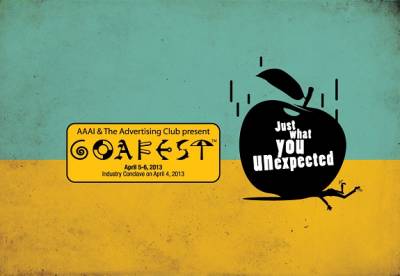Goafest 2013 to focus on issues of relevance surrounding the advertising industry
The first day of Goafest 2013 kicked off well with its theme ‘Just What You Unexpected’ as it engaged with professionals from different domains of media and renowned people from different organizations. The key speakers of the day were Nitin Paranjpe, MD & CEO, HUL; R S Sodhi, MD, GCMMF Ltd. (Amul); Arundhati Bhattacharya, MD, SBI Capital Markets; Suresh Bandi, Deputy MD, Panasonic India; Arunab Das Sharma, President, Revenue, Bennett Coleman and Co. Ltd.; Harit Nagpal, MD and CEO, Tata Sky.
The eighth edition of Goafest 2013 began with the Advertising Conclave at the Zuri White Sands. This year the theme of the Goafest Advertising Conclave is ‘Time to Listen’. The conclave highlighted the shortcomings of media and creative agencies, as perceived by major advertisers. The conclave, sponsored by Discovery Channel, saw over 200 industry leaders drawn from marketing, advertising and media. The conclave also had some of India’s biggest marketers present who identified areas which creative and media agencies need to focus on.
In his introductory address, Srinivasan Swamy, Chairman, Goafest Advertising Conclave 2013 said, “Our conclaves always focus on issues of relevance to us. In the past we have talked about how to grow the advertising industry, or on the changing agency structure or how advertising is more than creative and media etc. In the same vein, this year we will get advertisers to tell us how we can be more relevant to their needs. The theme ‘Time to Listen’ captures this essence.”
Nitin Paranjpe delivered the inaugural address. He spoke about the shift from creating a myth and communicating it to finding a truth and sharing it – and winning back consumer trust. He also went on to explain that advertising has existed forever, it’s just that tool and techniques have changed with times. He also added that, “The consumer’s experience has been transformed. 76 per cent of the consumer doesn’t believe that the companies and brands tell truth while they advertise. So, it’s important to build trust among the consumers. People, process and documentation are the key factors that will work.
R.S.Sodhi belonging to FMCG group, agreeing with Paranjpe said, “It’s a fact that consumer’s don’t want to watch advertisements between their favorite shows. He pointed out keys that will benefit the agency as well as the client. He feels that, “There should be stability in the care team, consistency in strengthening and execution, should keep the brand contemporary fresh and relevant to society, there should be complete trust between client and agency, they should never underestimate or try to cheat the consumers, they shouldn’t change the strategy that’s already doing well for the company, they should understand the client as well as the consumers and should offer end result.”
He concluded his session with a recommendation: “I would want to do away with advertising awards (in their current form). They are evaluated by advertising agencies and are presented by the advertising fraternity. I would rather see them evaluated by clients.”
Arundhati Bhattacharya outlined the need for performance-based advertising fees. Elaborating further on this point she said, “Agencies must partner the organisation, explore non-traditional or new media opportunities in the BFSI segment and performance-based advertising (fee) must be brought in. Once the profits increase, that could result in an increase in the advertising budget, so it’s good news for both parties. An ad agency must also be able to understand the ethos of an organization.” Bhattacharya who belongs to the financial sector pointed out that agencies and agents are not the same hence the priority changes.
“Today clients need value, result, process quality in less fees. But they should take care of employees, clients and consumers,” said Suresh Bandi who represented consumer durable products. He explained that while clients are looking for ‘Good, Fast and Cheap’ advertising, they often get only two of the three parameters. “People need value. A result is what clients are truly seeking. They appreciate creativity but do not forget that we are not buying creativity just for the sake of it,” he said.
Arunabh Das Sharma, president, revenue, Bennett, Coleman & Co listed out the five micro- trends. The first trend was agencies seeing the world through 30-second television commercials, which indicated lack of focus on the bigger picture.
The second trend concerned separation of creative, media and account planning and he is of the opinion that there is a demise of planning due to genuine lack of market insight. The third trend he noted was that of media planning being subservient to buyers and hence according to him one does not see high quality media planning. The fourth dealt with decline in the quality of "client-facing" talent, which he explained was due to lack of creativity and forethought, high attrition rate of talent and struggles to match compensation compared to other sectors. The fifth and last trend more universal in nature centred around overused excuses given by agencies.
Harit Nagpal, managing director and CEO, Tata Sky, highlighted the tumultuous client-agency relationship. He cautioned marketers, that agencies only helped achieve clients' business goals, and did not actually assist in building up marketing strategy, help in sales growth or even achieve business objectives.
As per his views marketers should get specialists to manage the discipline they wanted to opt for promotions and advertising, instead of going to an agency that simply translated a thought/idea for different media, irrespective of whether it suited a medium.
His four basic mantras to clients and agencies consist of taking a stand, staying a specialist, clarifying the roles, and adapting to the complexity of the present situation.
This session was carried forward with a panel discussion and was moderated by Sunil Alagh, Founder & CEO, SKA Advisors and had all the speakers as panelists. Ethics of advertising and when agencies will start claiming the honesty of their ads was the hot topic of discussion.
In conclusion, Nitin Paranjpe shared a remarkable insight with his rapt audiences. He said, “Yesterday's advertising mantra is ‘Create a myth and communicate it to your consumers’; while today's advertising mantra is ‘Find a human truth and share it with your consumers’.
Thus we can sum up that the first day of Goafest 2013 was wrapped around this year’s theme and was centred around a brief of the two day Conclave’s agenda.











Share
Facebook
YouTube
Tweet
Twitter
LinkedIn